
A new study adds to the growing evidence that fish oil supplements in the diet of pregnant women can bolster their infants' immune systems.
In this case, babies overcame their colds faster if during pregnancy their mothers had taken 400 milligrams of a supplements containing docosahexaen oic acid (DHA).
"DHA is important to the unborn and newborn child, and pregnant women should make sure that they get enough of it, preferably from fish, but otherwise from supplements," said Philip Calder, a professor of nutritional epidemiology at the University of Southampton in England, who was not involved with the research.
The study is published online in the journal Pediatrics.
Fish facts
The study was part of a larger randomized controlled trial conducted in Mexico by researchers from Emory University and local investigators. These latest findings are based on results from more than 800 women, half of whom took DHA supplements daily during pregnancy.
Infants in the study were examined at 1, 3 and 6 months old, and their mothers were asked whether, in the past two weeks, the infants had symptoms such as congestion, phlegm, vomiting and rashes and how long those lasted. The mothers had been provided with diaries to track illnesses.
While both groups had similar numbers of illnesses, infants whose mothers had taken DHA saw many illness symptoms reduced — for example, they spent 14 percent less time being ill by age 3 months — although other symptoms appeared to last longer.
DHA is one of the three types of omega-3 fatty acids found in fish and fish oils. While DHA has been shown to potentially benefit cognitive development, immune development and heart disease, it is not a major part of the American diet. Pregnant mothers may also be concerned about eating fish because of the mercury content.
"In general, DHA intakes are low in the United States among pregnant women and among adults in general because we are not seafood eaters," said Susan Carlson, a professor of nutrition at the University of Kansas Medical Center. "It is a nutrient that is found in relatively few foods in good concentrations, and they tend not to be foods that Americans consume routinely."
But a growing body of research is showing that DHA may provide a number of benefits for the infants.
"DHA is vital for early infant brain and eye development," Calder said. "It is a key building block, and has important functional roles that cannot be fulfilled by other fatty acids."
Calder added that DHA is probably also important for heart, vascular and immune system development.
Long-term findings
Study researcher Usha Ramakrishnan, an associate professor of global health at Emory, said the researchers are continuing to investigate the long-term benefits of DHA.
"[We are] interested in the long-term implications, if these children grow better and are smarter," Ramakrishnan said, noting the children are turning 4 now, and researchers will study their school performance at age 5, among other outcomes.
The ongoing investigation in Mexico will also allow researchers to examine some of the less encouraging findings of the study, and see if they should be larger areas of concern. While the duration of cold symptoms were shorter in children taking DHA, those children had rashes and bouts of vomiting last longer.
"We don't know what to make of it, and when you're looking at a whole bunch of things, some are significant and some aren't," Ramakrishnan said.
Carlson agreed that small numbers of illnesses may have driven that finding, noting that colds were a far bigger concern than vomiting, as more than 200 colds occurred, but only 30 episodes of vomiting.
As with many nutrients, the benefits of DHA may vary with the dose taken. For example, while vitamin C may provide benefits in warding off colds, taking megadoses of the vitamin don't appear to offer a larger benefit and may be harmful in some cases.
Similarly, Carlson said, the large benefits of DHA in many current studies may be the result of people having deficiencies. Additional DHA may not benefit people who already get it from their diet.
While researchers are still examining the benefits of DHA and the proper dose to take, Ramakrishnan stopped short of a broad recommendation.
"If women want to take it, it's unlikely to cause harm in the overall picture of the babies we looked at," Ramakrishnan said. "The magnitude of the benefit seems to be variable and depends on the outcome you looked at. It may not be a benefit for everybody."
Article courtesy of foxnews.com

